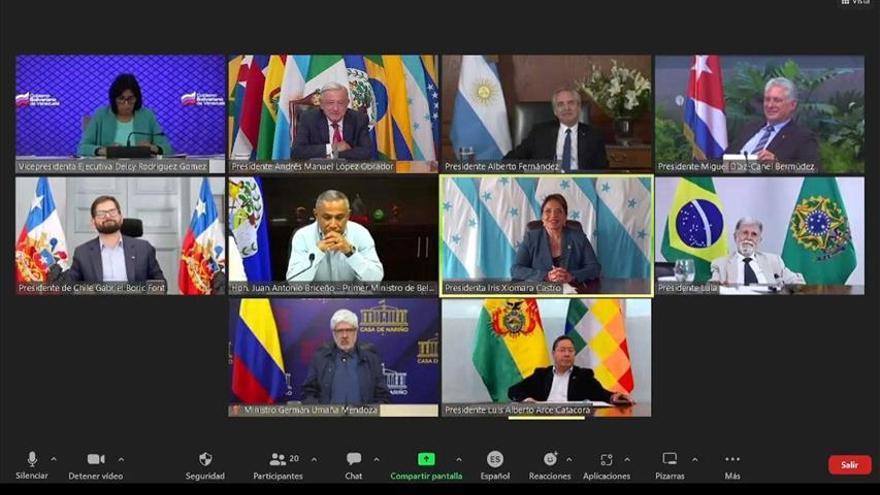
![]() 14ymedio, Madrid, 6 April 2023 — Eleven countries of the Community of Latin American and Caribbean States, including Cuba, agreed on Wednesday to create an alliance to jointly confront inflation. In that virtual meeting convened by the Mexican president, Andrés Manuel López Obrador, the Cuban president, Miguel Díaz-Canel, made several proposals, which he described as “practical actions of great impact” and include resorting to barter and making a thousand doctors available to his partners.
14ymedio, Madrid, 6 April 2023 — Eleven countries of the Community of Latin American and Caribbean States, including Cuba, agreed on Wednesday to create an alliance to jointly confront inflation. In that virtual meeting convened by the Mexican president, Andrés Manuel López Obrador, the Cuban president, Miguel Díaz-Canel, made several proposals, which he described as “practical actions of great impact” and include resorting to barter and making a thousand doctors available to his partners.
In their final statement, the leaders of Mexico, Cuba, Argentina, Belize, Bolivia, Brazil, Chile, Colombia, Honduras, Venezuela and Saint Vincent and the Grenadines agreed, among other points, to “generate a principled circle of prosperity, economic growth and sustainable development for Latin America and the Caribbean.”
To do this, they commit to creating a “technical working group” composed of representatives of the Government of each country to establish an action plan with “logistical, financial and other measures” that allow “the exchange of basic basket products and intermediate goods” in “better conditions,” with the priority of “lowering prices” for the “poorer and most vulnerable” population.
The assembled countries consider that the rise in prices around the world is due, among other things, to “extra-regional military conflicts,” the slow economic recovery after the COVID-19 pandemic and “a large external debt that especially affects low- and middle-income countries.” The text also mentions among the causes of inflation “the application of unilateral coercive measures contrary to international law that affect some countries,” without specifically referring to the United States sanctions against the regimes of Cuba and Venezuela.
Thus, they highlight “the need to have a more just, democratic, inclusive and supportive international financial system that allows the countries of our region to access the necessary financial resources and improve the conditions of external indebtedness.”
Without forgetting “the current trade agreements that each country maintains” – for example, those of Mexico with Canada and the United States, Caricom or Mercosur – they commit to “finding alternatives that allow improving physical and economic access to products.”

Among their proposals are “improving the efficiency of the entry and exit of products through ports and borders,” the “exchange of intermediate inputs, machinery and technology for the benefit of agricultural productivity” and “facilitating access to credit at the international level.”
The joint statement includes a good part of the suggestions made by Miguel Díaz-Canel in his speech. The Cuban president suggested barter, or exchange. “This is an attractive modality for Cuba due to the severe restrictions imposed on us by the blockade and the arbitrary and unjustified inclusion in the list of countries that, according to the United States, sponsor terrorism, which severely limits the country’s financial relations,” he explained in his speech, picked up by the official press.
Díaz-Canel, the head of a country immersed in an unprecedented crisis, also urges them to “take advantage of the potential, capacity and political will to undertake, without delay, practical actions of great impact on the well-being of our peoples.”
As an example, he says: “In Cuba we have two plants with the capacity to produce fertilizers; however, we do not have the necessary raw materials for it. To produce fertilizer we need phosphorus, nitrogen and potassium. If some of the countries reach an agreement with Cuba to supply these inputs, we would be able to produce fertilizer and export it, and I think this is a scheme that can serve in other areas and in other countries.”
He also offers Cuba’s “extensive experience, particularly in the Health sector. We would be able to provide 1,000 comprehensive general practitioners to the populations that require it and also apply programs to confront chronic diseases such as diabetes and blindness,” reiterates the president, whose health missions deployed in dozens of countries are the country’s first source of income, ahead of remittances and tourism.
Díaz-Canel took the opportunity to thank the Mexican president, whom he refers to as “brother Andrés Manuel,” for organizing the summit.
López Obrador himself starred in one of the most controversial moments, declaring, with laughter and without an iota of irony: “I should go to Cuba and live there.”
The leaders called for an in-person meeting on May 6 and 7 in Cancun, Mexico.
Translated by Regina Anavy
COLLABORATE WITH OUR WORK: The 14ymedio team is committed to practicing serious journalism that reflects Cuba’s reality in all its depth. Thank you for joining us on this long journey. We invite you to continue supporting us by becoming a member of 14ymedio now. Together we can continue transforming journalism in Cuba.
